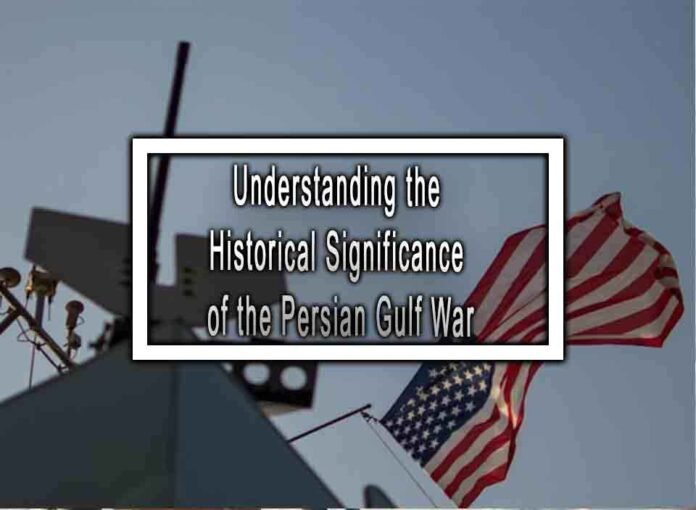The Persian Gulf War, also known as Operation Desert Storm, was a significant conflict in modern history that took place in 1990-1991. It had a profound impact on the region and the world. Here’s an exploration of the historical significance of the Persian Gulf War:
Response to Aggression:
The Persian Gulf War is historically significant as a response to Iraq’s invasion of Kuwait on August 2, 1990. Iraq’s aggression violated international norms and principles of sovereignty, leading to a swift and decisive international response.
International Coalition:
The formation of a broad international coalition, led by the United States and authorized by the United Nations, was a landmark event. It demonstrated the ability of the international community to come together to oppose aggression and uphold the principles of territorial integrity and sovereignty.
Use of Military Force:
The Persian Gulf War marked a significant use of military force in the post-Cold War era. It showcased the capabilities of modern military technology, including precision-guided munitions, stealth aircraft, and advanced communication systems. The war highlighted the effectiveness of coalition warfare.
Liberation of Kuwait:
The primary objective of the coalition was to liberate Kuwait from Iraqi occupation. The successful liberation of Kuwait demonstrated the ability of a multinational force to achieve a specific military objective.
Air Campaign:
The war began with an extensive air campaign, which was a departure from traditional military strategies. The “shock and awe” tactics employed in the air campaign influenced future military operations.
Swift and Decisive Victory:
The ground offensive that followed the air campaign was remarkably swift and decisive. Coalition forces rapidly pushed Iraqi troops out of Kuwait and effectively ended the conflict.
Humanitarian and Environmental Consequences:
The war had significant humanitarian and environmental consequences. It led to the displacement of hundreds of thousands of people, environmental damage from oil spills, and health issues related to the use of depleted uranium munitions.
Impact on the Middle East:
The Persian Gulf War reshaped regional alliances and power dynamics in the Middle East. It left a legacy of instability and long-term consequences, including the continued presence of U.S. military forces in the region.
Continued Isolation of Iraq:
After the war, Iraq remained isolated and under international sanctions. This had a lasting impact on its economy and population. Iraq’s defiance of UN resolutions and weapons inspections eventually led to the 2003 invasion of Iraq.
Lessons Learned:
The Persian Gulf War had a lasting impact on military and foreign policy thinking. It influenced subsequent U.S. military interventions, such as the 2003 invasion of Iraq, and shaped discussions about the use of force in international conflicts.
In summary, the Persian Gulf War was historically significant for its response to aggression, the formation of an international coalition, the use of modern military technology, the liberation of Kuwait, and its enduring impact on the Middle East and international relations. It remains a pivotal event in contemporary history with far-reaching implications.











